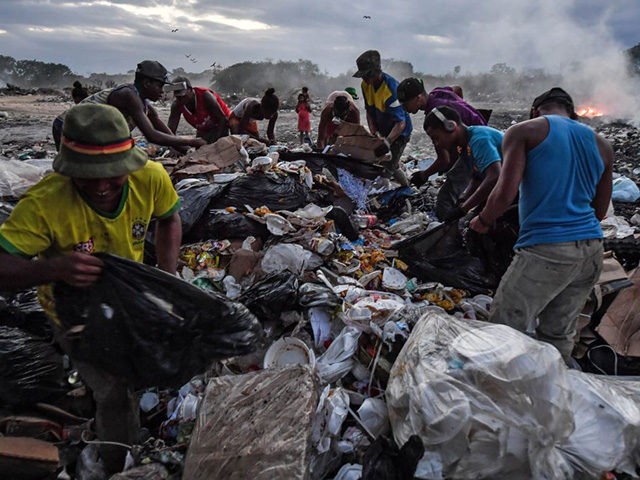A Venezuelan human rights non-governmental organization found in a national poll that over 90 percent of people living in the country were food insecure, the office of President Juan Guaidó noted Sunday.
Guaidó — who remains largely powerless despite his status as the constitutional head of state of the country — has repeatedly condemned the regime of socialist dictator Nicolás Maduro for starving the Venezuelan people since the former was sworn in as president in early 2019, when Maduro’s last legitimate term as president ended. Socialist mismanagement of the economy and extreme corruption on the part of Maduro’s top henchmen have devastated what was once Latin America’s richest nation, leaving many relying on eating garbage to survive or surviving on barely one meal a day since at least 2016. A study published that year found 15 percent of Venezuelans depended on consuming food scraps found in piles of garbage to survive.
The food security survey highlighted by the office of the legitimate president on Sunday was published by the Venezuelan Observatory for Food Security and Nutrition (OVSAN) last week. The poll found that only nine percent of Venezuelans enjoy food security, meaning they have a stable source of food they can rely on and know that they will be able to feed themselves the next time they are hungry.
The over 90 percent of Venezuelans who do not have guaranteed access to food significantly surpasses the number in a similar survey by Human Rights Watch published in 2018. At the time, the organization found 80 percent of the country could not access the amount of food they needed to survive and that the average Venezuelan had lost 24 pounds involuntarily in 2017. The weight loss statistic is the most recent one available of its kind for the country.
The OVSAN study published last week found that 55 percent of Venezuelans “restrict their consumption of food” to ensure they have something to eat in the future. About the same number, 56 percent, are using up life savings to buy food. The vast majority (74 percent) buy what they eat on a daily basis “to be able to survive.”
Other notable statistics include the 69.1 percent who say that they are sacrificing clothing, education, or other basic needs to be able to afford food, and the 78.9 percent who answered “yes” when asked if they are employing “survival tactics” to find their daily caloric intake.
The survey polled a little over 2,000 homes nationwide between December 2020 and February 2021.
OVSAN has also warned that the Chinese coronavirus pandemic has worsened the food crisis in the country. Maduro has enacted a bizarre lockdown schedule known as “7+7” in which the nation is forced into a strict lockdown for seven days, followed by no restrictions on movement whatsoever. No evidence suggests the system works and no other country in the world has implemented it.
The lockdowns, and their erratic implementation, resulted in “less productivity, greater difficulty to transport products, or difficulty in selling the products given that people are locked at home,” OVSAN warned in March. “There are fewer products available, which has also increased prices.”
Venezuela has been undergoing hyperinflation for almost the entirety of Maduro’s tenure. At press time, Dolar Today, a website that monitors the black market value of the Venezuelan bolivar, places the value of one American dollar at 2,760,224.75 bolivars, meaning every food item in the country is worth millions, or billions, of bolivars.
Venezuelan civil society groups first warned the world that the nation had run out of food in 2016, after three years of Maduro in power. Since then, stories of Venezuelans hunting cats and dogs for food, killing and eating zoo animals, and dying after eating toxic vegetables like sour yuca, have become commonplace in the country. Venezuelans have taken to referring to their starvation and weight loss as the “Maduro diet,” in honor of the dictator. Maduro, who is significantly heavier than most Venezuelans and regularly appears on television feasting on empanadas and cake, joked about this mass food shortage in 2016.
“Maduro’s diet gets you hard, no need for Viagra!” he said on live television that year.
Wealthy Venezuelans in Maduro’s inner circle do not appear to lack for any food. The regime has ensured that outlets like Megasis, an Iranian-owned supermarket, remain well stocked for Maduro cronies. Many also have access to foreign currency or travel abroad often to locations like Miami. Maduro personally took a luxury trip to Turkey in 2018 that included a stop at a high-end steak restaurant owned by vocal communist and Turkish chef Nusret Gökçe, known popularly as “Salt Bae.”
The World Food Program (WFP), a United Nations agency, announced it would begin operations in Venezuela with Maduro’s blessing next week. The WFP and other humanitarian aid groups have spent years attempting to convince Maduro to allow them to offer food to the general population, but Maduro banned them on the grounds that no humanitarian crisis exists in the country. Vice President Delcy Rodriguez has warned the country’s starving population in the past, without evidence, that any food offered via international aid is poisoned and “carcinogenic,” particularly if coming from the United States.
“The United States is trying to poison our people with chemicals,” she claimed in 2019.
It does not appear that Rodriguez is putting up a similar fight to the WFP aid. The group signed a memorandum of understanding with the Maduro regime, despite its status as not being the legal government of Venezuela, allowing it to ship food to schools, aspiring to feed 1.5 million children.
The WFP is an arm of the United Nations; the Maduro regime currently holds a seat on the U.N. Human Rights Council.

COMMENTS
Please let us know if you're having issues with commenting.